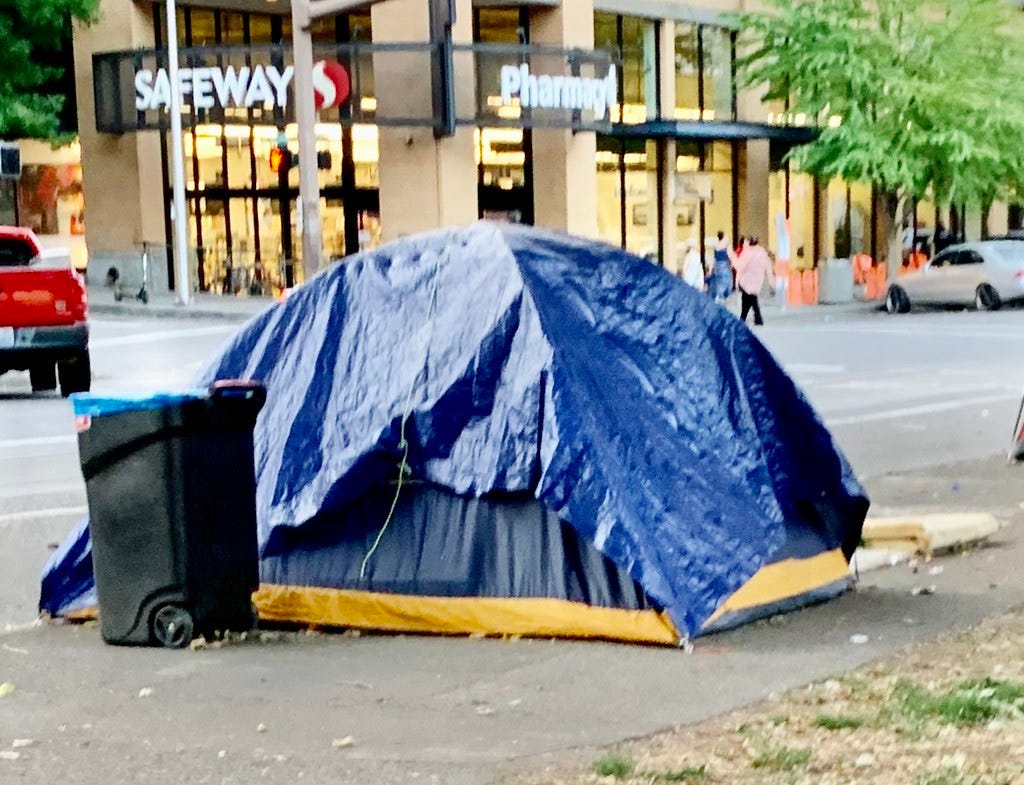Avoiding a Future of Tent Cities and Unrealized Potential
The Oregon state government owes young people and our most vulnerable communities a fighting chance at our “American dream.”
EDITOR’S NOTE: This piece is a part of our #GovernorGoals series. Learn more about it here. Send your goals on one of the selected topics to theway@or360.org for potential publication.
You can see the impact of income inequality within blocks of our school, Lincoln High in the Goose Hollow neighborhood of Portland. To the west of campus, mansions line the hills, and to the east, small cities of colorful tents line the streets downtown. A walk along a downtown block reveals a profoundly unequal society divided by race, gender, and ability.
During the pandemic, this inequality has worsened. Houseless populations skyrocketed. The number of families living below the poverty line increased to over 13%. On the other side of the chasm spreading the rich from the poor, billionaires got 62% richer, furthering the income gap between economic classes in our society.
As these disparities grow, so does the inequality between races and genders, with people of color and women being disproportionately affected by the changes brought on by the pandemic. We are students that fall into these marginalized groups; this crisis and the complacency of our government will directly impact our futures.
That complacency appears in many fundamental public policy areas. The lack of affordable housing, universal health care, and significant flaws in the SNAP food benefit programs lead to an inescapable cycle of poverty. Current attempts at solutions, feeble and disillusioned, only serve to waste valuable time, and create the false impression of progress.
A few examples: Multnomah County guaranteed shelter to every child in 2016, only to backtrack the next year as shelters overflowed and motel room costs skyrocketed. Last November, Portland voted for a $652.8 million bill to support affordable housing in the city, and we’ve seen little change since. Although Portland plans to build 2,000 supportive housing units by 2028, this is nowhere near the forecasted 10-year demand. Our ever-expanding homeless shelters are a temporary solution at best, upholding the system as it is. We need rapid, state-wide action.
As a diverse group of students, these trends are deeply disturbing. Poverty devastates our city and, as a result, our own futures. But more importantly, the groups most impacted by income inequality are people like us: women and people of color, as well as our generation as a whole. When compared to others, our futures don’t appear as bright due to public policy failings.
The most promising careers end up in specific hands. A study from the 2019-2020 academic year identified that of the graduates from Oregon State University with engineering majors, 82% were men and only 18% were female. Those advantages compound. A study from 2016 found that women still make 79 cents to every dollar a man makes, and women of color make even less. Another Oregon report from 2019 determined that white people held 81% of positions in the workforce, despite making up only 75% of the population. In high-paying jobs, this inequality is even larger. Of Oregon’s doctors, 63% are male compared to 37% female. There is also a stark generational difference in wealth and opportunity.
Facing stagnant wages and heightening prices of education and housing, our generation will be excluded from the financial stability past generations enjoyed. The way we look and the institutional and implicit bias that infects Oregon and our world as a whole serve as an unbreakable ceiling for our potential.
Income inequality and poverty are deeply systemic issues, but they are issues with solutions. Oregon needs to invest in sustainable, affordable housing for the most vulnerable. Finland successfully fights houselessness with a “housing-first” policy, quickly intervening and rehousing people at risk of losing their homes while providing housing for those experiencing chronic homelessness. Larger cities need to scale affordable housing construction to address the expounding problem; two thousand units won’t cut it. Multnomah County’s shelter guarantee failed because indigent families fled to Portland, exhausting shelters; Oregon’s government must model housing-first policies throughout Oregon. Housing is only a symptom of larger issues.
Oregon needs aggressive systemic approaches to battle income inequality on a broader scale. Oregon needs expanded protections for hiring or workplace discrimination based on ability, sexual orientation, gender identity, or racial identity. Oregon needs to bridge the gap in education by offering free 4-year degrees at Oregon’s seven public universities to everyone. Oregon needs accountability from companies to end the race and gender pay gap through severe penalties for companies that favor privileged employees. Oregon needs a dramatic increase in sustainable public jobs with living wages. Oregon needs a $15 minimum wage.
The Oregon state government owes young people and our most vulnerable communities a fighting chance at our “American dream.”
Shreya Soman is a high school sophomore in Portland and an aspiring advocate for human rights and environmental justice. She enjoys volunteer work, writing, and performance arts and hopes to continue to work to help her community and those in need.
Iris WeaverBell is a high school sophomore in Portland, who is an advocate for student civic engagement and giving back to her community through the public service club she leads at Lincoln High School, CommuniCare, currently fundraising for vulnerable communities experiencing houselessness.
@IWeaverbell on Twitter
Elise Yu is a high school sophomore in Portland and a leader in her community. She fosters interests in STEM, ballet, music, and social equity through volunteering and involvement in marketing at nonprofit organizations.
Angela Zhang is a Portland high school student and passionate about law, STEM, public speaking, while contributing to her community through coaching middle and high school students in speech and debate.
@azhang04 on Twitter
Ekansh Gupta is a high school student in Portland, and a participant in Democratic Socialists of America. He is passionate about the climate crisis, and governmental and systemic reform.
Photo credit: "Portland, homeless, garbage. City provided garbage can next to the tent, but when you look at the entrance to the tent, garbage in & out. Portland Oregon. July 2020" by drburtoni is licensed under CC BY-NC-ND 2.0












Thanks for being passionate about this subject and issue we face in our society today. For my benefit, what kind of research did you perform in order to determine the racial inequity you describe in your piece? Thanks for the feed back. Jim